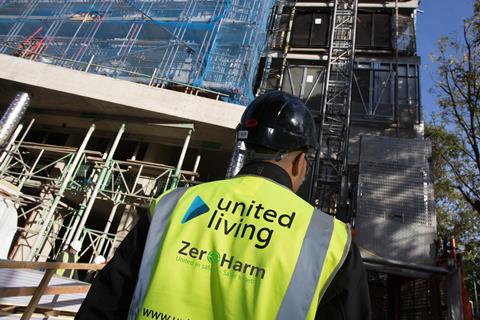Group records pre-tax loss but says underlying profitability rose
United Living has reported an increased in revenue to £718m in results for the year to 31 March 2025.
In its previous statutory accounts, it reported turnover of £453m, however this was for a reduced reporting period of eight months.
The property and infrastructure business provided unaudited figures for the previous full year, which showed that this year’s income was 14.5% up on £627m for the 12 months to 31 March 2024.

Its pre-tax loss of £42.9m came after a £46.3m depreciation, amortisation and impairment, as well as exceptional items of £33.5m.
Exceptional items include losses associated with the winding down of the new homes business (£22.4m), costs associated with “transformation, investment and deal-related costs assoiated with M&A and refinancing” (£2.8m), and restructuring costs, including redundancy.
The group’s adjusted EBITDA figure, which shows the firm’s earnings prior to these exceptional items and to the costs of deprecitation, amortisation and impairment, rose 33% to £68m (2024: £51m).
Meanwhile, its “cash profit before tax” increased to £38.5m, up from £29.4m. This figure is reached by taking the adjusted EBITDA figure and adjusting it for interest accrued on shareholder loans and amortisation of goodwill created through acquisitions.
The group said that, because it is private equity-backed and highly acquisitive, this metric was a better representation of its true performance as ”it adjusts the reported profit for two non-cash accounting entries that are a result of our ownership structure”.
United Living has made a slew of acquisitions this financial year, most recently taking a majority stake in Glenelly Infrastructure Solutions.
It also acquired civil engineering contractor Peter Duffy Ltd, power contractor Jones, social housing property services business PiLON, and it took a majority stake in both GTEC Training Limited and Thormer Solutions Limited.
It also made a “strategic decision” to wind down its new homes business to focus on its core infrastructure businesses. Existing projects, which include multi-apartment schemes and single-family homes, will continue until completion but no further opportunities will be pursued.
The group now has two primary businesses. Utility Infrastructure, which provides a range of gas, water and telecoms services to major owners and operators across the UK, and Social Infrastructure, which provides planned and reactive maintenance of social housing and local authority assets.
It reported a strong cash position at year end (£70m in 2025, compared with £52m in 2024) having secured new contracts worth £920m during the financial year.
Key contracts awarded during the period include a £250m contract to deliver CO₂ pipeline for Liverpool Bay CCS for CO2 Transportation and Storage in the UK, as well as a £150m, a United Utilities 10-year Framework, and a £40m contract with London Borough of Harrow for property repairs and maintenance.
>>See also: United Living Group acquires social housing maintenance firm
>>See also: Notting Hill Genesis and United Living pay £550,000 to residents to settle High Court cladding case
Neil Armstrong, chairman and chief executive of United Living, said: “We are pleased to announce another record financial result for United Living Group, ending the year with a robust cash position and a significant forward order book that reflects sustained growth across our business.
“Our sectors continue to benefit from powerful long-term drivers from critical infrastructure investment linked to decarbonisation, resilience, digital connectivity and demand for safe, sustainable living environments. These trends are creating increasing demand for the services United Living is well placed to deliver.”


























No comments yet